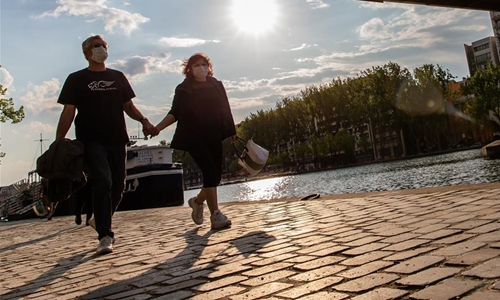Minuscule traces of coronavirus in Paris water not a risk: Chinese scholars
By Deng Xiaoci Source:Global Times Published: 2020/4/20 18:28:44

People wearing face masks walk along the Bassin de la Villette in Paris, France, on April 12, 2020. As of Sunday, the number of people who have died from the COVID-19 in France totaled 14,393, representing a one-day increase of 561, down from Saturday's 643, while serious cases decreased for the fourth straight day. (Photo by Aurelien Morissard/Xinhua)
The detection of "minuscule traces" of the novel coronavirus in non-potable water in Paris is very unlikely to raise the local epidemic infection risk for residents, Chinese scholars said on Monday, due to the extremely low density of the virus in water. They added that the discovery is probably only a result of sample contamination by collectors who themselves were infected.The French city's water authority laboratory detected tiny amounts of the virus in four of 27 samples collected from around the city, AFP reported on Sunday, which led to an immediate shutdown of the network as a precaution.
The report also quoted a city official as saying that drinking water is at no risk of contamination in Paris, as it is supplied from a "totally independent" network and "can be consumed without any risk," stressed Celia Blauel, the city's top environmental official. The non-potable water, drawn from the Seine River and the Ourcq canal, is used to clean streets and water the greenery in the city's parks and gardens - currently closed to the public - and supply their ornamental fountains, per the report.
Yang Zhanqiu, a Wuhan-based virologist, told the Global Times on Monday that it is impossible for such water contamination by the novel coronavirus to threaten public health, as water is only related to the digestive transmission route, which has nothing to do with the spread of novel coronavirus.
According to the World Health Organization (WHO), novel coronavirus is a respiratory virus that spreads primarily through droplets generated when an infected person coughs or sneezes, or through droplets of saliva or discharge from the nose.
Yao Maosheng, a bioaerosol study expert and professor at the College of Environmental Sciences and Engineering in Peking University, Beijing, also reached this conclusion from another perspective, saying the density of the virus in the water, if any, cannot reach a level that presents a risk of spread.
If you imagine the amount of virus required to pollute the whole of the river Seine, it is very unlikely to take place, Yao said.
It is probable that some COVID-19 patients polluted the sample during the collecting process, or contaminated the collection site, such as the surface of water or utensils, he noted.
Yang also noted that during the epidemic outbreak, any part of nature, not only water, can be polluted with the novel coronavirus, but such contamination does not necessarily mean it will result in human infection.
France on Sunday reported 395 deaths from COVID-19 in 24 hours as the number of new hospitalizations continued a slow decline.
The new deaths - 227 in hospitals and 168 in nursing homes - brought France's total epidemic death toll to 19,718, top health official Jerome Salomon told reporters.
As of Sunday, there have been 110,721 confirmed COVID-19 cases with 19,294 deaths reported in France, according to WHO data.